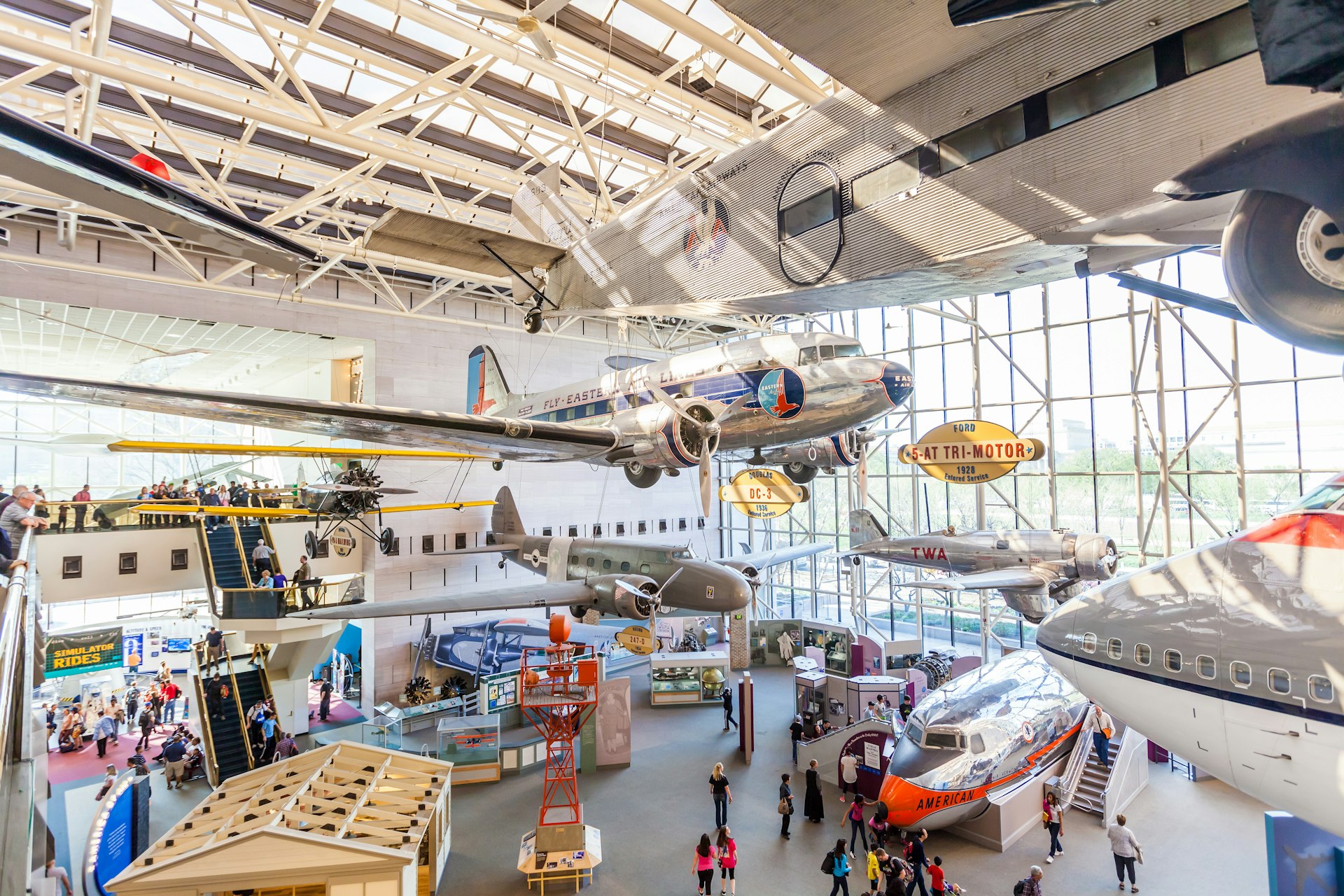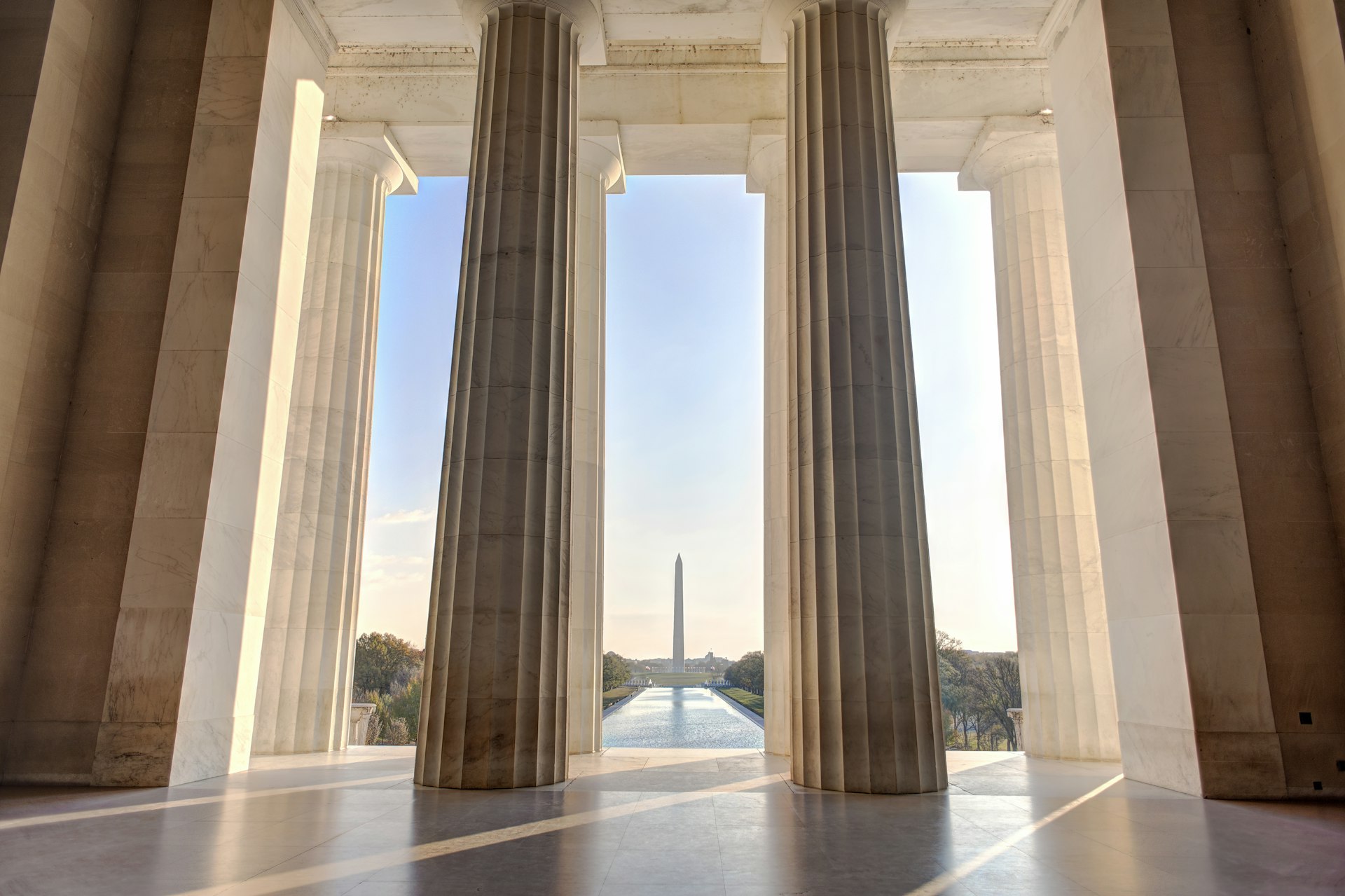Washington, DC, has a reputation for being expensive, but when it comes to things to do, it’s an unfair accusation.
To start, all of the Smithsonian museums are free to visit, and there’s also a packed calendar of free and cheap events, ranging from movie nights to open-air gigs at some of the city’s top venues. Here are the best ways to get the most out of your hard-earned cash during a visit to Washington, DC, along with a guide to daily costs to help you budget.
Daily costs
- Metro fare from Dulles International Airport to downtown Washington, DC: approx $6
- Uber fare from Dulles International Airport to downtown Washington, DC (peak time): from $47
- Nightly rate for a five-star hotel in downtown DC: from $463 per room
- Nightly rate for a Washington, DC hostel: $63
- Cup of coffee in a downtown cafe: $5
- Three-course dinner at a mid-range restaurant: from $60 per person
- Pint of beer in a downtown bar: $9
- Day ticket for Big Bus tour: $54 per adult/$45 per child
Average daily cost: $170+
1. Avoid cherry blossom season, and consider a winter visit
Prices for accommodation and flights are at their lowest between December and March, so if you can handle the chillier temperatures – in January, temperatures of 25°F (-4°C) are typical – this is a great time to visit DC. Additionally, December is when the city dons its Christmas finery, and the National Mall’s snow-dusted monuments look truly stunning. Prices tend to stay low throughout spring, although if you’re on a budget, it’s best avoid the second half of March, which is when the city’s cherry blossom trees bloom. Summer is when many families visit, but don’t assume this means high prices – because the high humidity is a deterrent for some, many hotels will often roll out great deals to lure travelers who might be put off by the sweltering temperatures. This is particularly true in August and September – the sweatiest months.
2. Choose your airport carefully
DC’s metro system has been transformed in recent years. The extension of the Silver Line means it’s now easy to travel from Dulles International Airport to downtown DC, although if you’re arriving by air, it’s still worth seeing if you can bag a cheaper flight that goes into Baltimore (it takes under an hour to travel between the two cities by train). Ronald Reagan Washington National Airport is the closest airport to downtown Washington, DC – just across the water from the National Mall in Arlington, Virginia – but it’s served by far fewer airlines.
Here are our other top tips for getting around in Washington, DC
3. Stay and shop with budget brands
If you need to stock up on supplies for picnics or on-the-go snacks, pay a one-off visit to a supermarket with branches throughout the city like Trader Joe’s, or stop by the sprawling Eastern Market on Capitol Hill’s 225 7th St SE. Otherwise, you risk racking up costs with frequent visits to smaller (and more expensive) grocery stores, such as the 7-Elevens you’ll see on almost every street. When it comes to hotels, if you’d prefer sticking with a well-known brand but are keen to keep costs down, consider Days Inn or Travelodge, both of which have properties throughout the city.

4. Visit the Smithsonian museums
If you love a museum but you’re on a budget, focus on the Smithsonian ones – there are 21, and they’re all free to enter. But it gets better because the Smithsonian’s National Zoo is free to visit, too – you’ll just need to reserve your ticket online. There’s a packed calendar of free activities here, ranging from talks by world-renowned bird behaviorists to meet-the-keeper sessions.
Want more free things to do? Here are DC’s best experiences that cost nothing at all
5. Pay-what-you-wish on a walking tour
There are numerous walking tours of Washington, DC. One of the most popular operators is DC by Foot, which offers pay-what-you-wish tours covering areas such as the National Mall, the Tidal Basin and Georgetown. The themed tours, which include ghost tours of Georgetown and ones focusing on the assassination of President Lincoln, are especially popular with kids.
6. Enjoy DC’s diverse program of events and shows
It’s not just the museums that are admission-free – there are numerous free annual events in Washington, DC, too. The Kennedy Center’s Millennium Stage runs a year-round series of events that are free to attend – check out the website to get the latest information. The events are incredibly diverse, including performances by gospel choirs, orchestras and pop stars such as Grammy Award-winning singer Nella.
The Kennedy Center also hosts free weekly film screenings in the Justice Forum lecture hall or outside in the REACH Plaza. Tickets for these events simply need to be reserved on the website – but be quick because they’re distributed on a first-come, first-serve basis. The Sunset Cinema also holds events in the waterfront Wharf district. During the summer, movies are screened at an open-air cinema on Transit Pier. They’re free to attend – simply reserve your ticket via the website.
7. Eat at Ben’s Chili Bowl
For cheap eats in DC, head to Ben’s Chili Bowl. A bowl of its famous chili starts from just $6.79, but this is more than just a restaurant – it’s a Washington, DC institution. It was opened by Trinidadian immigrant Ben Ali in 1958. In 1968, during the riots following Martin Luther King Jr’s assassination, a curfew was imposed. However, Ben’s Chili Bowl was allowed to remain open due to its popularity with the police trying to calm the riots, and it was also a popular hangout for Black activists. Previous customers include George W Bush, Anthony Bourdain and Nicolas Sarkozy, and it has served as a backdrop for several movies, including State of Play (2009) and the Pelican Brief (1993). Check out the restaurant’s wall of fame to see snaps of famous guests and learn about its history.

8. Sign up for a food tour
Food tours offer a brilliant way to enjoy the city’s deliciously diverse culinary offerings. These tours typically cost around $70 upwards per person but usually include tastings at a range of restaurants, cafes and bars. Additionally, the guides are a wealth of information, whether you’re looking for cheap eats in Georgetown or wondering where to find the best happy hours in downtown Washington, DC. DC Metro Food Tours offers a vast range of tours, including ones focusing on Eastern Market, the city’s oldest continuously running food market (and a great place for free samples).
9. Go to an event at an embassy
Washington, DC, has almost 200 embassies, and many hold regular free and paid-for events, ranging from book readings to intimate concerts. The best way to find out about these events is to check out the embassies’ websites or browse Eventbrite. The events that charge for entry can offer brilliant value for money.
Visiting during May? This is when the annual Passport DC event takes place. For one month, embassies fling open their doors for behind-the-scenes tours and a wide range of events, many of which are free.
10. Walk or use the bike-share scheme instead of cabs
This riverside city is fabulously flat, so it’s easy to explore on foot – in other words, when it comes to getting around DC, there’s no need to splash the cash on its notoriously expensive cabs. Alternatively, consider saddling up – the city’s Capital Bikeshare scheme has one of the most extensive bike-share schemes in the US. We recommend the day pass, which costs just $8. You’ll get 24 hours of unlimited 45-minute bike rides, and with 5000 bikes available at 600 stands, you’ll never be far from a pick-up or drop-off point.
11. Check out the world’s largest library
DC’s Library of Congress, founded in 1800, has millions of books, audio recordings, manuscripts and maps, and it’s not just bookworms who will appreciate this beautiful building. It holds the largest rare-book collection in North America, the largest historical collection of US telephone directories and the world’s largest collection of comic books. It’s free to visit (you’ll just need to reserve tickets online), and the most beautiful areas include the fresco-adorned circular Main Reading Room. There’s a fantastic range of permanent and temporary exhibitions to check out, too.
Ready to plan your trip to Washington, DC?
Find the best times to visit
These experiences should be on your DC itinerary
Get to know DC like a local in these top neighborhoods
Enjoy a city break on these day trips
